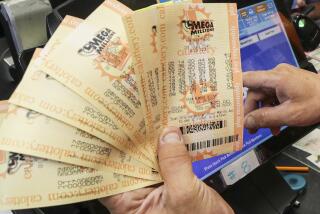Are We Having Fun Yet?
- Share via
A hot Sunday in San Fernando. The cocktail lounge of a Mexican restaurant. This loudmouthed old guy in baggy pants and Hawaiian shirt stands at the bar, slurping down red margaritas, holding court. Whispers circulate. The man in the shirt just hit the lottery jackpot. The man in the shirt is worth three-point-something-million dollars.
The waitresses cling to him. They are of a type--hair teased in tribute to Farrah Fawcett, legs sheathed in shiny, industrial-grade nylons. They keep his glass full and his tab open. They shriek at his jokes and rub his shoulders. He seems almost dizzied by the attention.
“So how long do you think the money will last?” I ask my friend Nick as we watch this new California millionaire.
“Eh,” he says, considering, “I’d give it a year, max.”
The California Lottery reminds me of Gold Rush stories I read as a kid. The common moral was that the most lasting fortunes were made, not by the miner-49ers, but by merchants who dealt in picks and jeans.
In a similar way, the lottery rewards most reliably its 700 employees and the retailers who receive a cut of sales and the advertising agencies paid to create the high-gloss television spots that sell us pretty dreams of palaces and Porsches. Yes, a few players hit big jackpots. Most don’t. This is but one of the lottery’s lies.
We are told the lottery is fun. I have watched people play for years, but have seldom seen a smile. You spot them in grocery store lines, grubbily scratching away. When they win a few bucks, they cash in and buy more tickets on the spot. This produces more scratching and more disappointment, and then it’s see you later, Mr. Dreamer.
We are told the lottery somehow isn’t quite gambling. I fail to see any difference between Lotto and the proposed casino ships that so worry our state attorney general . . . or the Indian bingo games that the feds harass . . . or the back-yard bookie operations cops traditionally bust on Super Bowl Sunday. The lottery is an organized gambling operation and, as such, lives by a fundamental rule: Always, in the end, the house must win.
We are told also that the lottery pays for public education. Yes, it forwards a third of its take to schools. All that amounts to, though, is roughly 3% of the education budget statewide. Still, the schools connection is crucial. Like free cocktails served at casino blackjack tables, it provides a rationale for losers to return to the game.
“I may lose my shirt,” they say in Vegas, “but they treat me like a king.”
“I never win,” they say in the lottery, “but at least it pays for public schools.”
What we are not told is that the lottery is simply a sucker’s tax. It evolved from the premise that post-Proposition 13 Californians, especially the middle class and below, must be tricked into coughing up money for the public good. In truth, as recent passage of transportation initiatives and education bonds demonstrate, we’re still willing to tax ourselves--on a selective basis, and for suitable projects. We’ve simply lost interest in writing blank checks, a distinction Sacramento politicians often fail to grasp.
Now, the good news. The California Lottery is dying. Sales are in steep decline. Desperate, the lottery commissioners have tampered with the rules to allow for more advertising--”to get people,” as lottery Director Sharon Sharp said, “back in the fun of it again.”
Sharp blamed the tailspin on everything from the recession to the L. A. riots, which knocked out 100 ticket outlets. I found the riot mention revealing, especially as Sharp went on to report--as a happy development--that lottery players in burned-out neighborhoods finally had begun to find alternative ticket outlets. Tell me again how it’s not a poor people’s tax.
Anyway, my own explanation of the lottery’s decline is simpler. We wanted a lottery once. We don’t want one anymore. After seven years, we’re wise to the lies. Unlike the early days, the lottery stories now in circulation are not the stuff of Robin Leach. Rather, they are more pathetic anecdotes, tales of squandered jackpots and Lotto addicts, of wrenching near-misses:
There was this blue-collar foreman. Each week, he bet the same lottery numbers. Each week, he lost. One Friday night, he was called back to work and couldn’t buy a ticket. That week, his numbers hit. It’s said he missed out on eight-point-something million, and that he carries around the stubs to prove it. I wonder where this guy drinks. I wonder if the cocktail waitresses keep his glass full, his tab open and laugh at all his jokes.



